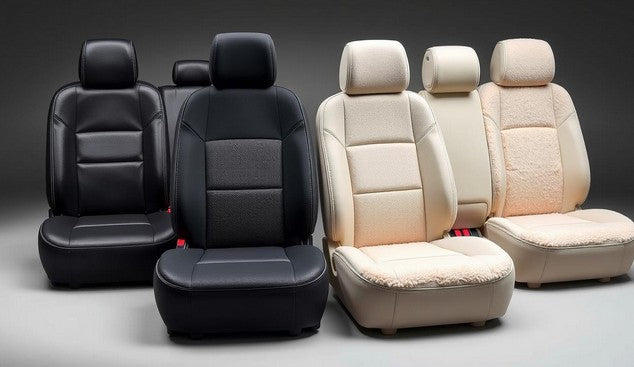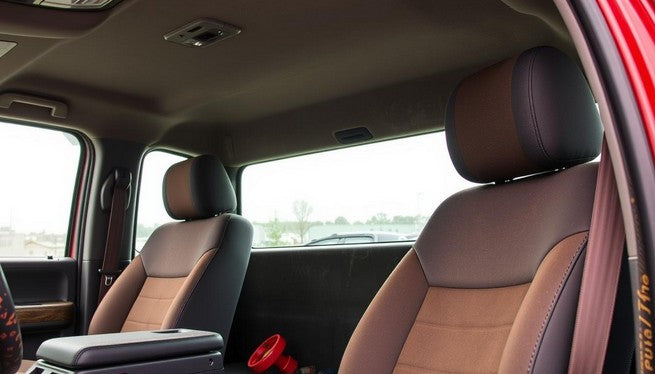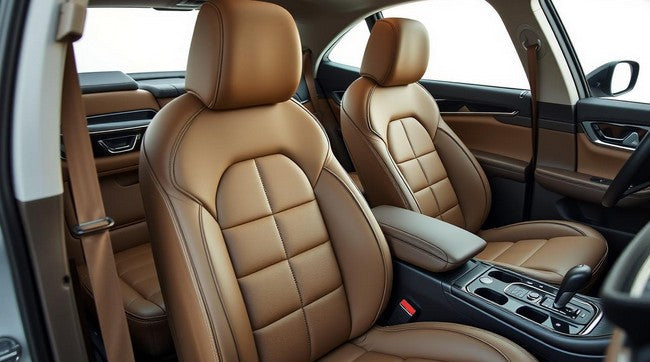Selecting the right material for your custom seat covers is crucial for ensuring long-lasting protection, optimal comfort, and a stylish interior. Whether you're looking to shield your seats from daily wear and tear, enhance comfort during long drives, or simply upgrade your vehicle's aesthetics, the material you choose will significantly impact your satisfaction. This comprehensive guide will help you navigate through the various options available, comparing their durability, maintenance requirements, cost factors, and suitability for different climates and lifestyles.
Why Material Selection Matters for Custom Seat Covers
The material of your seat covers does more than just determine how they look. It directly affects how long they'll last, how comfortable they'll feel in different seasons, and how much maintenance they'll require. High-quality custom seat cover materials can protect your original upholstery from spills, stains, UV damage, and everyday wear, potentially saving you thousands in reupholstery costs down the road.
Beyond protection, the right material enhances your driving experience. Breathable fabrics keep you cool during summer months, while insulating materials provide warmth in winter. For those with active lifestyles, water-resistant options offer peace of mind against unexpected spills or outdoor adventures. Families with children or pets benefit from easy-to-clean, durable materials that stand up to constant use.
Not Sure Which Material Is Right For You?
Explore our complete collection of custom seat covers and compare materials side-by-side.
Leather and Leatherette Seat Cover Materials
Advantages
- Premium look and feel that enhances vehicle interior
- Excellent durability with proper care (5+ years lifespan)
- Develops attractive patina over time (genuine leather)
- Relatively easy to clean with appropriate products
- Adds significant resale value to your vehicle
Disadvantages
- Higher price point ($300-600+ for genuine leather)
- Can become hot in summer and cold in winter
- Requires regular conditioning to prevent cracking
- Genuine leather needs protection from UV exposure
- Not ideal for pets with claws or active children
Genuine Leather vs. Leatherette
Genuine leather offers unmatched luxury and breathability but comes at a premium price point. It develops a unique patina over time that many enthusiasts appreciate. Leatherette (premium vinyl) provides a similar look at a more accessible price point ($200-350) and offers superior water resistance and easier maintenance, making it practical for families and active lifestyles.
For climate considerations, both materials can become hot in summer and cold in winter, though genuine leather breathes better. If you live in extreme climates, consider adding seat heating/cooling or opt for a more temperature-stable material.
Experience the luxury and durability of custom fit leather seat covers.
Neoprene and Neosupreme Custom Seat Cover Materials
Advantages
- Excellent water resistance (ideal for active lifestyles)
- Superior comfort with foam padding and cushioning
- UV resistant and won't fade in sunlight
- Temperature stable - doesn't get extremely hot or cold
- Sporty, modern appearance with various color options
Disadvantages
- Mid-range price point ($210-330 depending on quality)
- Can trap heat and moisture during extended sitting
- May have a distinct rubber smell initially
- Not as luxurious-looking as leather options
- Can tear if caught on sharp objects
CR-Grade Neoprene vs. Neosupreme
CR-Grade Neoprene is the same material used in wetsuits, offering maximum water resistance and durability. It's ideal for outdoor enthusiasts, beach-goers, and those with water-related activities. Neosupreme is a more affordable alternative that provides many of the same benefits at a lower price point ($210 vs. $330 for CR-Grade), though with slightly reduced water resistance and durability.
Both materials excel in variable climates, as they insulate against cold while not becoming uncomfortably hot in summer. They're particularly popular among families with children, pet owners, and those with active outdoor lifestyles.
Protect your seats from water, spills, and outdoor adventures with waterproof neoprene covers.
Ballistic and Heavy-Duty Custom Seat Cover Materials
Advantages
- Maximum durability and abrasion resistance
- Highly resistant to tears, punctures, and wear
- Water-resistant and easy to clean
- Ideal for work vehicles and commercial use
- UV resistant and won't fade in sunlight
Disadvantages
- Mid-range price point ($220-300)
- Not as soft or comfortable as other options
- Utilitarian appearance may not suit luxury vehicles
- Can be noisy (fabric friction) when getting in/out
- Limited color options compared to other materials
Ballistic vs. Tactical Fabrics
Ballistic fabric seat covers are made from the same tough nylon material used in bulletproof vests and luggage, offering exceptional durability. They're perfect for work trucks, construction vehicles, and anyone who regularly carries tools or equipment. Tactical versions often include additional features like MOLLE webbing, pockets, and specialized patterns.
These materials are ideal for harsh environments and heavy use scenarios. They perform well in all climates and are particularly popular among contractors, outdoor workers, and off-road enthusiasts who prioritize protection over plush comfort.
Maximum protection for work trucks and heavy-duty applications.
Material Comparison: Finding Your Perfect Custom Seat Cover Material
|
Material |
Price Range |
Durability |
Water Resistance |
Comfort |
Maintenance |
Best For |
|
Genuine Leather |
$600+ |
High (5+ years) |
Moderate |
Excellent |
High |
Luxury vehicles, premium look |
|
Leatherette |
$330-370 |
High (4-5 years) |
High |
Good |
Low |
Luxury look with easier care |
|
CR-Grade Neoprene |
$330 |
High (3-4 years) |
Excellent |
Very Good |
Low |
Water sports, beach, active lifestyle |
|
Neosupreme |
$210 |
Good (2-3 years) |
Very Good |
Good |
Low |
Families, pets, budget-conscious |
|
Ballistic |
$220 |
Excellent (5+ years) |
Good |
Moderate |
Very Low |
Work trucks, tools, heavy use |
|
Polycotton |
$200-215 |
Moderate (2-3 years) |
Low-Moderate |
Excellent |
Moderate |
Comfort, breathability, hot climates |
|
Spacer Mesh |
$200 |
Good (3-4 years) |
Moderate |
Excellent |
Low |
Hot climates, breathability |
|
Saddle Blanket |
$219 |
High (4-5 years) |
Moderate |
Good |
Moderate |
Western style, trucks, rugged look |
Pro Tip: Consider your primary use case when selecting a material. If you frequently transport children or pets, prioritize water resistance and ease of cleaning. For luxury vehicles, focus on appearance and comfort. Work vehicles benefit most from durability and protection.
Key Considerations When Choosing Custom Seat Cover Materials
Climate and Weather Factors
Your local climate should heavily influence your material choice. In hot, sunny regions, breathable materials like spacer mesh or polycotton prevent heat buildup and uncomfortable sweating. For cold climates, neoprene and leather provide better insulation. If you experience varied seasons, consider neoprene or neosupreme for their temperature stability across conditions.
Water Resistance and Spill Protection
For families with young children, outdoor enthusiasts, or those who frequently eat and drink in their vehicles, water resistance is crucial. CR-Grade neoprene offers the best protection against liquid spills, followed by leatherette and ballistic fabrics. Some polycotton covers come with water-resistant treatments that provide moderate protection while maintaining breathability.
Pet and Child Friendliness
If you regularly transport pets or children, durability and ease of cleaning become paramount. Ballistic and tactical fabrics resist claw marks and rough treatment, while neoprene and leatherette can be quickly wiped clean of spills and accidents. Avoid genuine leather if you have pets with sharp claws, as it's more susceptible to punctures and scratches.
Sustainability and Eco-Friendly Options
Environmentally conscious consumers now have more options than ever. Look for recycled polyester blends, organic cotton covers, and plant-based leatherette alternatives. Some manufacturers now offer seat covers made from recycled plastic bottles or sustainable natural fibers. These eco-friendly options typically come with a slight price premium but reduce environmental impact.
Need Help With Your Decision?
Our product specialists can help you find the perfect material for your specific needs.
Maintenance Tips for Custom Seat Cover Materials
Leather & Leatherette Care
- Clean with specialized leather cleaner or mild soap
- Apply leather conditioner every 3-6 months
- Avoid direct sunlight for prolonged periods
- Clean spills immediately to prevent staining
- Use leather protectant to guard against UV damage
Neoprene & Neosupreme Care
- Wipe with damp cloth for regular cleaning
- Use mild soap for stubborn stains
- Allow to air dry completely before use
- Avoid harsh chemicals and bleach
- Use neoprene-safe protectant spray annually
Ballistic & Tactical Fabric Care
- Vacuum regularly to remove debris
- Spot clean with mild detergent
- Brush with soft brush to maintain texture
- Allow to air dry if wet
- Apply fabric protectant annually
Polycotton & Fabric Care
- Vacuum frequently to prevent dirt buildup
- Spot clean with upholstery cleaner
- Some covers are machine washable (check label)
- Air dry completely before reinstalling
- Apply fabric guard to improve water resistance
"The lifespan of your custom seat covers can be doubled with proper maintenance. Regular cleaning and appropriate care specific to your material type is the key to long-lasting protection and appearance."
- Automotive Interior Specialist
Case Study: Finding the Perfect Custom Seat Cover Material
The Johnson family was facing a common dilemma. With two young children, a large dog, and an active outdoor lifestyle that included regular beach trips and camping, their SUV's factory cloth seats were showing significant wear after just one year. Stains from juice spills, muddy paw prints, and general dirt were becoming increasingly difficult to clean.
Their Requirements:
- Excellent water and stain resistance for kids' spills
- Durability against dog claws and rough use
- Easy cleaning after outdoor adventures
- Comfortable for long road trips
- Reasonable price point for a family budget
The Solution:
After researching various materials, the Johnsons chose CR-Grade Neoprene seat covers for their SUV. The wetsuit-like material offered superior water resistance for beach days and drink spills, while providing enough durability to withstand their dog's claws. The cushioned feel made long drives comfortable, and the covers could be quickly wiped clean after muddy adventures.
The Result:
Two years later, the neoprene seat covers still look nearly new despite constant use. The family reports that cleanup is simple—usually requiring just a damp cloth—and the covers have prevented any damage to the original upholstery. The investment has already paid for itself by eliminating the need for professional cleaning and preserving the vehicle's resale value.
Key Takeaway: When selecting custom seat cover materials, prioritize your most frequent use cases and biggest challenges. For this family, water resistance and durability were more important than luxury appearance, making neoprene the ideal choice despite its mid-range price point.
Recommended Brands for Quality Custom Seat Cover Materials
Coverking
Known for premium materials and precise fit, Coverking offers everything from genuine leather to ballistic fabrics. Their custom-fit approach ensures your seat covers look and perform like factory installations.
Best For: Neosupreme, CR-Grade Neoprene, and Ballistic materials
Price Range: $210-$600
Warranty: 2-5 years depending on material
ShearComfort
With over 40 years in the industry, ShearComfort specializes in custom-fit seat covers with excellent quality control. Their materials undergo rigorous testing for durability and fit.
Best For: Cordura (similar to Ballistic), Leatherette, and Waterproof options
Price Range: $200-$500
Warranty: 2-3 years with satisfaction guarantee
Carhartt
Known for workwear durability, Carhartt's seat covers bring the same rugged reliability to vehicle interiors. Ideal for work trucks and heavy-duty applications.
Best For: Duck canvas, heavy-duty fabrics, and water-resistant materials
Price Range: $200-$400
Warranty: Limited lifetime warranty on some products
Industry Insight: Most premium custom seat cover manufacturers use digital scanning technology to ensure precise fit for your specific vehicle make, model, and year. This technology has dramatically improved fit quality in recent years, eliminating the saggy, ill-fitting covers of the past.
Conclusion: Selecting Your Ideal Custom Seat Cover Material
Choosing the right custom seat cover material is a balance between your specific needs, budget, and aesthetic preferences. For maximum durability and protection in work environments or with pets, ballistic and tactical fabrics offer unmatched toughness. Families with children might prioritize the water resistance and easy cleaning of neoprene or leatherette. Those seeking luxury and comfort might invest in genuine leather or premium synthetic alternatives.
Remember that the best material for you depends on your unique circumstances:
- For luxury and comfort: Genuine leather or premium leatherette
- For water resistance and active lifestyles: CR-Grade neoprene or neosupreme
- For maximum durability and work vehicles: Ballistic or tactical fabrics
- For hot climates and breathability: Spacer mesh or polycotton
- For budget-conscious protection: Neosupreme or polycotton drill
Whichever material you choose, quality custom seat covers represent a wise investment in protecting your vehicle's interior, enhancing comfort, and maintaining resale value. With proper care and maintenance, premium custom seat covers can provide years of protection and enjoyment.
Still Not Sure Which Material Is Right For You?
See and feel the difference yourself with our fabric sample kit. Compare textures, colors, and quality before making your decision.




Leave a comment
This site is protected by hCaptcha and the hCaptcha Privacy Policy and Terms of Service apply.